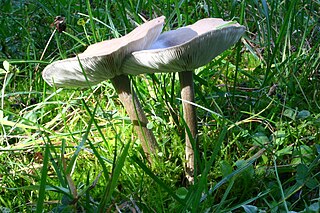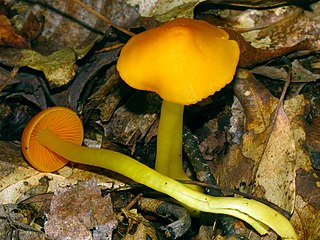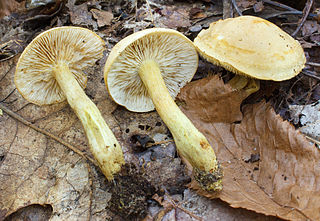
Melanoleuca is a poorly known genus of saprotrophic mushrooms traditionally classified in the family Tricholomataceae. Most are small to medium sized, white, brown, ocher or gray with a cylindrical to subcylindrical stipe and white to pale yellowish gills. The basidiospores are ellipsoid and ornamented with amyloid warts. Melanoleuca is considered a difficult group to study due to their macroscopic similarities among species and the need of a thorough microscopic analysis to separate species. DNA studies have determined that this genus is closely related to Amanita and Pluteus and that it does not belong to the family Tricholomataceae.

Humidicutis marginata is a gilled fungus of the waxcap family.
Tricholosporum pseudosordidum is a species of fungus in the family Tricholomataceae. It is known from Florida.
Sanford Myron Zeller was an American mycologist.
Tricholoma venenatum is a mushroom of the agaric genus Tricholoma. It was first described scientifically by American mycologist George F. Atkinson in 1908.

Tricholoma davisiae is a mushroom of the agaric genus Tricholoma. It was first formally described by Charles Horton Peck in 1900.
Tricholoma farinaceum is a mushroom of the agaric genus Tricholoma.

Tricholoma floridanum is a mushroom of the agaric genus Tricholoma. It was first formally described by William Alphonso Murrill in 1945.

Tricholoma fumosoluteum is a mushroom of the agaric genus Tricholoma. First described by Charles Horton Peck in 1875 as Agaricus fumosoluteus, it was transferred to the genus Tricholoma by Pier Andrea Saccardo in 1887.

Tricholoma intermedium is a mushroom of the agaric genus Tricholoma. It was formally described by American mycologist Charles Horton Peck in 1888.

Tricholoma niveipes is a mushroom of the agaric genus Tricholoma. It was formally described as new to science by American mycologist Charles Horton Peck in 1901.

Tricholoma odorum is a mushroom of the agaric genus Tricholoma. It was formally described in 1898 by American mycologist Charles Horton Peck. It is considered inedible.
Tricholoma acre is a mushroom of the agaric genus Tricholoma. The fruit bodies have light gray caps and stems, light grey gills, and an acrid taste.

Tricholoma subluteum is a mushroom of the agaric genus Tricholoma. Found in North America, it was described in 1904 by Charles Horton Peck.

Tricholoma subresplendens is a mushroom of the agaric genus Tricholoma. It was first described by American mycologist William Alphonso Murrill in 1914.
Tricholoma zangii is a mushroom of the agaric genus Tricholoma. The species was originally described by mycologist Mu Zang in 1990, who called it Tricholoma quercicola. It was later discovered that this name was a later homonym of a North American species described by William Alphonso Murrill in 1949, and a new name was needed.

Tricholoma roseoacerbum is an agaric fungus of the genus Tricholoma. The species was first described by Italian mycologist Alfredo Riva in 1979 as Tricholoma pseudoimbricatum var. roseobrunneum, but that name competed with an older homonym, William Murrill's 1913 Tricholoma roseobrunneum. Riva published the species with a new replacement name in 1984. T. roseoacerbum is found in Europe and northeastern North America. The specific epithet roseoacerbum alludes to the rosy colouration in its cap, and overall resemblance to T. acerbum. This species is probably conspecific with Tricholoma radotinense Pilát & Charvát (1959).











